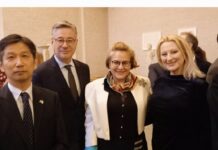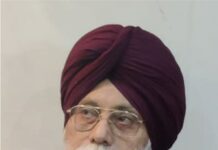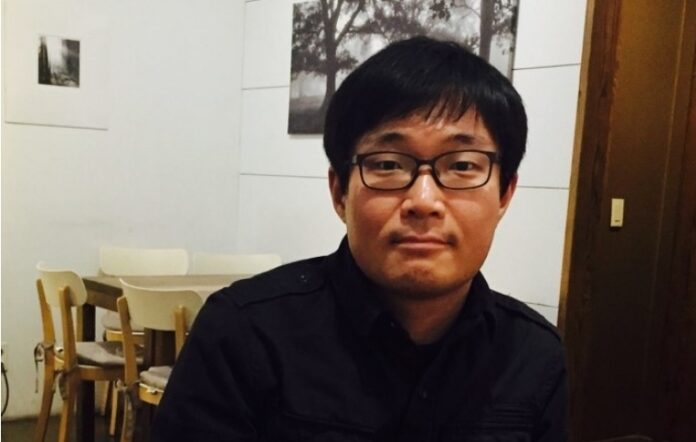Επιμέλεια: Εύα Πετροπούλου Λιανού
Poet Oneyc Ju was born in Seoul in 1980. In 2007, he made his debut in the autumn issue of Munhakdongne, a quarterly literary magazine, and subsequently published his first poetry collection, entitled “To Be,” in 2014, through the same publishing house.
Throughout his work, Ju endeavors to explore the language that conveys symbols and the concept of ‘work’ as a process that encompasses an infinite array of creative and destructive imagery. For him, the act of writing poetry is not an ultimate goal in itself. Rather, it serves as a means to express a unique life, comparable to drawing a mandala that expands and assimilates personal experiences.
Poet Euisu Byeon was born in Busan in 1956. In 1991, he published his first collection of poems, titled “City of Memories in a Distant Country.” In February 1996, his poems were featured in “Modern Poetics,” marking the beginning of his active participation in poetry group activities.
In 2002, Byeon released his second collection of poems, titled “When the Moon Rises, Trees Are Orgasms.” It was during this time that he began advocating for the [Symbolism of Unconsciousness]. In 2008, he published his third collection of poems, a lengthy work titled “Symbols of Secrets: Nature, Spirits, and Symbols.” Additionally, he released his fourth collection of poems, “Esoteric Symbol: A Parrot in the Black Sun,” as well as his first collection of reviews, “Esoteric Symbols: Waiting for the Fantastic Flock of Birds.” Moreover, he compiled an anthology of poetry titled “Symbols of the Unceremonious: Symbols and Signs, Invasion and Struggle.” Since then, Byeon has been an advocate for [metasymbolism: non-conscious symbolism].
In 2009, he published his second criticism book, “Artists Called by God,” followed by his third collection of reviews, “Slaughter Spirit and Poets.” In 2015, Byeon released “Symbolology of Convergence Studies” volumes I and II, presenting “Symbolology” as an independent new study.
In 2019, Byeon advocated for the co-creation of poetry, collaborating with Joo Won-ik, Kang Seo-yeon, Park Yi-young, Seo Sang-hwan, Lee Chae-hyun, and others. In 2021, he launched the quarterly poetry magazine “Symbolology Institute,” serving as both the publisher and editor. Finally, in 2022, Byeon published his fifth collection of poems, titled “The Physics of Metaphor.”
Poets’ Notes: The concept of co-creation was introduced by Goethe and Schiller during a tumultuous period. One notable characteristic is their use of a two-line poem to critique the criticism of their experiments.
In contrast, our objective is to generate a superior third work by merging the distinctive attributes of individual poets. Furthermore, we strive to establish co-creation as a novel methodology for contemporary poetry creation.
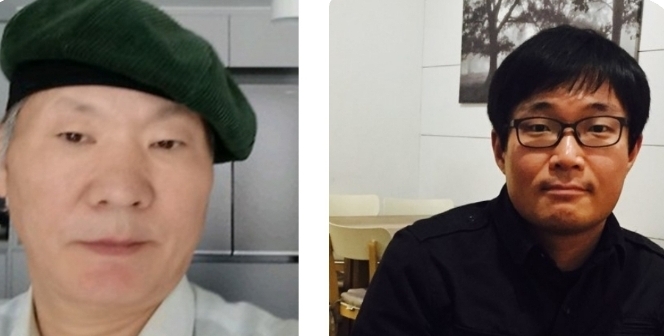
Violent sleep Poetry by Oneyc Ju
Composition of poetry by Euisu Byeon
Frozen light
written light
Chaos is a distant day
remember the writer
It has been a long time since I watched
a handful of fields
Trees falling into the sunlight
echo, carrying the flame
Intertwined with the sky
The plateau of time crumbles
light and sand
On the coast that flows into the skull
between the sun and the heart
It has been a long time
As if connecting a circle of light
Darkness that will not ripen
Caressing the cold instep,
like golden pearls
one two
play falling down
Next to the crouching shadow
asleep
Promises that won’t be held
The song left behind
under the moonlit palace
It’s a road not taken
Who is greeted with good luck in the text?
To those who look back
Light can’t tell
The sentence of sand, where even empty space has a bottom
Words not yet gone
Disappearance does not belong to life
As the darkness belonging to light casts away the shadows
As the black roots in the black ground unite
Nowhere, going somewhere
In the civilization of memory
Reflecting black light
White idea
The first sentence that is nowhere
In the last sentence that is nowhere
Nowhere
While living in the skin of a rose
So fleeting
While delusional
Of paradise
You will labor hysterically, as if it will take forever
The blue sky
Oblivion, a symptom
Flowing down
Desert and clouds
Silhouette
Flows close
Pushing the raised finger
Of the planets
Noise department
Mote
Bursting
Embracing the remnants of light
United
From the will of dust
Instead of our wish
Crazy
Gods,
Sand melts into glass
Poetry melts into time
Words not written down
Become a picture
The headline reads the reader,
After coloring
Time in the picture
Blank
Flowing with sand tears
Words not drawn
Like this
With dry clouds
Of blank space
Between the pale waters
In the middle of a forgotten civilization
Poetry is not reading
Intaglio
Like the darkness
Reading the obvious
No
Of splitting and rising passion
Lump of matter
Already tilted
Time is
With a handful of petals
Scoop up
Crazy
Divinity, or
White light exposure
Side by side with a knife
Extreme
Cry
Human language is ready
Food for angels
Leave this behind
Floating
The Cross
Melting
Solar
Hemorrhage
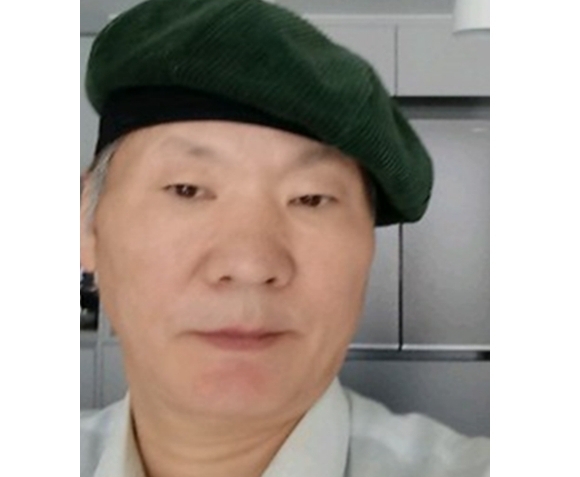
격렬한 잠
시문: 주원익(Oneyc Ju)
시문 구성: 변의수(Euisu Byeon)
얼어붙은 빛이
적혀 있는 빛
혼돈은 머나먼 날
쓰는 자를 떠올린다
바라보는 일은 오래되었다
한 줌의 들판
햇빛 속으로 넘어가는 나무들
불꽃을 데려가는
메아리
하늘과 허공이 교직된
시간의 고원이 부서져내린다
빛과 모래
두개골 속으로 흘러드는 연안에서
태양과 마음 사이
오랜 시간이 흘렀네
빛의 고리를 이어나가듯
무르익지 않을 암흑
차가운 발등을 어루만지고,
금 간 진주들처럼
하나 둘
쓰러져가는 놀이
웅크린 그림자 곁에
잠든
열리지 않을 약속
남겨진 노래가
달빛의 궁전 아래
가지 않은 길이다
누가 글 속의 행려로 맞이하는지
되돌아보는 자에게
빛은 말할 수 없고
허공도 바닥을 가진다는 모래의 문장을
아직 가지 않은 말
사라짐은 삶에 속하지 않는다
빛에 속한 어둠이 그림자를 흘려보내듯
검은 땅속의 검은 뿌리들이 연합하듯
어디에도 없는, 어딘가를 향하는
기억의 문명 속
검은 빛을 반사하는
백색의 관념
어디에도 없는 첫 문장이
어디에도 없는 마지막 문장에
어디에도 없는
장미의 살갗에 깃들어 사는 동안
이토록 찰나의
망상을 소요하면서
있었을 낙원의
영원이 소요된다는 히스테리를 노동하게 된다
푸른빛에 속한 하늘이
하나의 증상임을 망각하게 한다
흘러내리는
사막과 구름의
실루엣
가까이 흐른다
떠오른 손가락을 밀어내는
행성들의
소음과
티끌
파열하는
빛의 잔해를 품고
뭉쳐지는
먼지의 의지로부터
우리의 시원으로 대신
미쳐주는
신들,
모래가 녹아 유리로
시는 녹아 시간으로
적히지 않는 말은
그림이 되어
표제는 읽는 자를 읽고,
채색이 끝나면
그림 속 시간은
여백이 되어
모래 눈물로 흘러내리는
그려지지 않는 말
이렇게
말라붙은 구름으로
글을 떠내려 보내는 여백의
창백한 물살 사이
잊혀진 문명의 한밤에
시는 읽는 것이 아니다
뼈대를 음각하는
어두움처럼
명백함을 읽는 것이
아니다
갈라서고 차오르는 정념의
물질 덩어리
이미 기울어진
시간은
이것을 한 줌의 꽃잎으로
건져올린다
실성한
신성, 혹은
백광의 노출
나이프 곁에 나란한
극과 극의
부르짖음
인간의 언어가 준비되어 있다
천사를 위한 음식
이것을 남겨두고
떠도는
십자가
녹아내리는
태양의
하혈,
– 공동창작은 질풍노도 시기의 괴테와 실러가 선보였다. 그들은 자신들의 실험에 대한 비판을 비판하기 위한 2행시를 썼다는 게 특징이다.
그와 달리 우리의 작업은 개별 시인들의 특장을 융합하여 보다 좋은 제3의 작품을 제작하려 하며, 아울러 공동창작을 현대시 창작의 새로운 방법론으로 일반화하는데 의의를 두고 있다. (끝)



